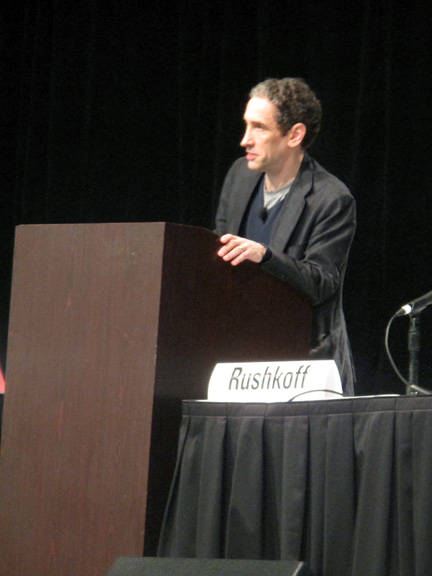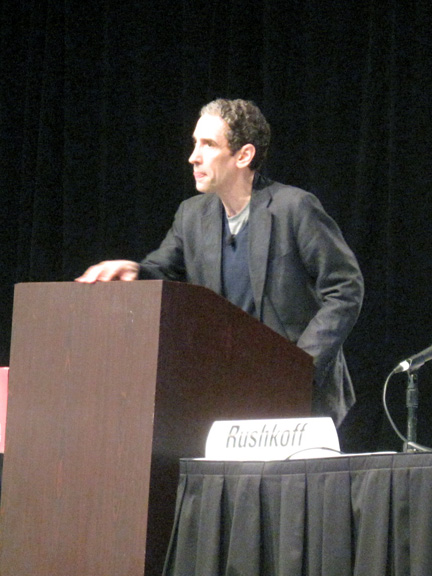Douglas Rushkoff, host of the documentaries The Merchants of Cool, The Persuaders and most recently Digital Nation, gave a thought-provoking talk titled Program or be Programmed: Ten Commands for a Digital Age. Rushkoff’s main point was that it is important to be able to contend with the biases of digital media, to be able to be aware of them and make conscious choices, rather than to fall into the set of choices being presented to us. He contends that if you are not a programmer, then you are one of the programmed. We must be aware of how we are being manipulated.
He structured his talk around the following ideas and associated commands.
10 biases of digital media/commands
1. Time. Thou shall not be always on. We are turning an asynchronous net as always on. He encouraged saying “My time is mine.”
2. Distance. Thou shalt not do from a distance what can be done in person. Using long distance in short distance situations. Don’t use distance learning in localized context.
3. Scale – the Internet is biased to scale up. Exalt the particular. Not everything scales, should scale or needs to scale.
4. Discrete – everything is a choice. You may always choose none of the above. Sites like Facebook promote forced choice, you have to choose from a set of options.
5. Complexity – the net reduces complexity. Thou shalt never be completely right.
6. Non-corporeal – out of body. Thou shalt not be anonymous. Rushkoff says “work against tendency of the net to promote anonymity.” Anonymity encourages becoming part of polarized mobs with no sense of consequence, it side steps prejudices. It is liberating to promote yourself online.
 7. Contact is king (not content). Remember the humans. “Social marketing is an oxymoron.”
7. Contact is king (not content). Remember the humans. “Social marketing is an oxymoron.”
8. Abstraction – as above, so not below. Print abstracts text from the scribe. Hypertext takes it a step further.
9. Openness. Thou shalt not steal. When there is no social contract, openness can continue until there is no one left to give things away. Nothing is free.
10. End users – technology is biased toward consumers. Programmed or be programmed.
This is a fascinating concept. Culture at large thinks about technology in terms of what can it do for us, rather than what can we make it do. Rushkoff says this is a false tradeoff. Companies are telling use, well if you want that, then we can’t really make it dependable. They try to appease us with minimal customization. He says that if we are looking at the Net as a product we consume rather than something we create with, we are doomed.
He is optimistic about digital media. We are at an important moment in time, there are new models of interaction. We need to program society, but to do that, we have to understand both the programs we use to do it and the codes and symbols we are working with, and how we relate to them.
He summed his talk with this: “If we create a society that is programmed, we will be the users and most importantly, the used.”
I was skeptical about this talk at first. I had felt the most recent documentary was a bit negative, full of too much pessimism about what technology was doing to us, and our children. But this talk was very much in line with my current philosophy, that we should use the net to create. It is an empowering time, full of responsibility. You can’t control your presentation or representation online unless you participate. And participation requires a deep understanding of the possibilities as well as the biases of technology.


Permalink
Permalink
Permalink
Permalink
Permalink
More from this presentation on the South by Southwest official youtube channel.
http://www.youtube.com/watch?v=imV3pPIUy1k
Permalink
Permalink
Permalink
Permalink
Permalink
Permalink
Permalink